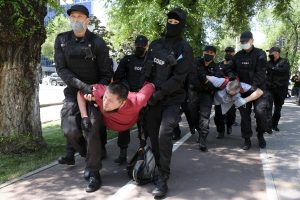Kazakhstan, like many corners of the world this past weekend, was the site of protests. The rallies took place under a recently revised protest law, though the results were the same: familiar images of security services physically carrying protesters to waiting vans to be taken away.
Two different groups had called for protests on June 6: the Democratic Choice of Kazakhstan (DCK) and the Democratic Party. The Democratic Party is an unregistered political party led by Zhanbolat Mamai. The party attempted to hold a founding congress in February, but was headed off by arrests before the activists could gather in Almaty and the disruption of a rally that did take place.
As I wrote at the time, it’s virtually impossible for a nascent political movement to achieve registration in Kazakhstan without the concerted support of the existing political structure:
Kazakh law requires at least 1,000 people, with representation from two-thirds of the regions and major cities, participate in the founding congress of a political party in order for it to achieve official registration. In addition, there is a requirement for 40,000 members. It’s virtually impossible for an opposition movement to attain official registration. At the phase the Democratic Party of Kazakhstan appears to be at — with 30 people who previously hoped to attend its ‘founding congress’ — it is already encountering state resistance. How could it ever get to 40,000 members if it cannot even be allowed to gather 30 together?
Under Kazakhstan’s recently revised protest law, only legally registered organizations can hold demonstrations.
The Democratic Choice of Kazakhstan (DCK) faces even higher hurdles given its leader is the Kazakh state’s nemesis, Mukhtar Ablyazov. DCK (also abbreviated DVK), and what has been described as its affiliate, the Koshe Party (Party of the Street), have both been banned by Kazakh authorities, which label them extremist organizations.
That designation is not shared by the international community. In March 2019, the European parliament adopted a resolution regarding the human rights situation in Kazakhstan, which specifically revered to DCK as a “peaceful opposition movement” and urged Nur-Sultan to end the arbitrary detention and harassment against “actual or perceived supporters” of DCK, as well as human rights activists, civil society organizations, and political opposition movements.
So on June 6, when both organizations called for rallies, small groups took to the streets in Nur-Sultan and other cities that included Almaty, Shymkent, Karaganda, and Aktobe. As an AFP report notes, the two groups — DCK and the Democratic Party — are rivals and the AFP’s correspondent reported “heated arguments over their opposition credentials” in Almaty. RFE/RL reports that across Kazakhstan on June 6, more than 100 were detained.
Ahead of the protests, Kazakhstan’s health minister had called on people to avoid protests, given the ongoing coronavirus pandemic.
The protesters’ demands included a range of familiar calls for the freeing of political prisoners, a ban on selling land to foreigners, and removing the designation of DCK as an extremist organization. Some chanted the familiar refrain “Old man, go away!” in reference to First President Nursultan Nazarbayev, who, despite resigning the presidency in March 2019, retains significant official and unofficial powers in Kazakhstan.
The protests also included new placards: RFE/RL reported that one group in Almaty held a banner that read “I Can’t Breathe” — in reference to the murder of George Floyd. Floyd’s death on May 25 — and the graphic videos of it — have sparked protests across the United States and, in solidarity, around the world. Floyd, an unarmed black man, was killed in Minneapolis when a white police officer knelt on his neck for nearly nine minutes.
The protests in Kazakhstan this past weekend were small, as usual, and disrupted, also as usual. If nothing else, the events of the weekend demonstrated that the new protest law doesn’t mean much for those who actually want to protest.
Includes reporting from the Associated Press.































